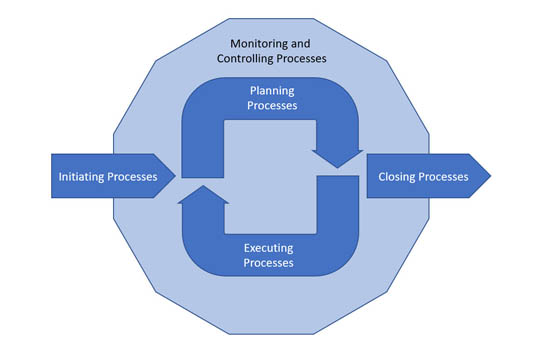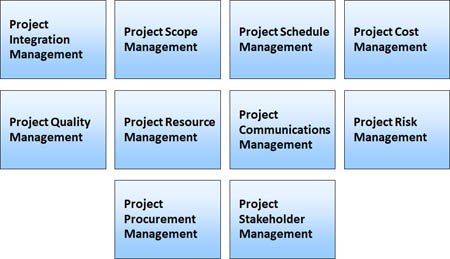Lexicon / Project Management Institute PMBOK Guide
Previous / next: PRINCE2
Following the Project Management Institute PMBOK® Guide
The following is the Doldrum Bay Consulting high-level summary of the project management PMBOK® Guide as proposed by the Project Management Institute (PMI) *.
PMBOK® Guide is a standard, not a project management methodology
Standards can give you guidance on what is best practice in your industry, whereas methodologies and frameworks provide practical processes for managing projects.
Therefore, the PMBOK® Guide is a standard containing good project management practices, processes and procedures. These best practices may help you to build your own methodology or framework, but the PMBOK® Guide is not a methodology or framework.
What is a project according to the PMI?
In their book, "A Guide to the Project Management Body of Knowledge (PMBOK® Guide)", the Project Management Institute (PMI®) define a project as a "temporary endeavor undertaken to create a unique product, service or result." [1]
- Temporary means that every project has a definite beginning and a definite end
- Unique means that the product, service or result is different in some distinguishing way from all similar products, services or results.
Projects are usually undertaken in order to drive change. These changes, from a business perspective, move an organisation from one state to another to allow them to achieve a specific objective.
What is Project Management according to the PMBOK®?
In their book, "A Guide to the Project Management Body of Knowledge (PMBOK® Guide)", the Project Management Institute (PMI®) define Project Management as the application of knowledge, skills, tools and techniques to project activities in order to meet or exceed stakeholder needs and expectations. [1]
This involves balancing competing demands among:
- scope, time, cost, and quality
- stakeholders with differing needs and expectations
- identified requirements (needs)
- unidentified requirements (informal or unstated expectations)
Key components in Project Management according to the PMBOK®
Project Life Cycle
A project life cycle is the series of phases that a project goes through from the start of the project to its completion.
Projects can vary in their size and complexity, but a typical project can be mapped to a structure similar to the following:
- Starting the project
- Organising and preparing
- Carrying out the work, and
- Closing the project
The Five Process Groups
The PMBOK® Guide describes a series of five specific process groups that are followed in typical projects.

- Initiating process group - those that define a new project or phase of a project
- Planning process group - those that define the scope of the project, refine the objectives, and then define the actions required to achieve the objectives.
- Executing process group - those that are performed in order to complete the work
- Monitoring and controlling process group - those that are required to track, review and regulate the progress and performance of the project, following the principles of Plan Do Check Act.
- Closing process group - those that are performed to formally complete or close the project.
Process groups are not the phases of the project. The processes within the process groups may need to be performed several times before a phase is complete.
Project Management Knowledge Areas
In addition to the process groups, project processes can also be categorised by what the PMI term as the ten Knowledge Areas. These are areas of project management grouped by their knowledge requirements.

- Project Integration Management
- Includes those process and activities that identify, define, combine, unify and coordinate the various processes and project management activities within the project management process groups
- Project Scope Management
- Includes those processes required to ensure that all required elements of the project are included that will enable the project to complete successfully.
- Project Schedule Management
- Includes those processes required to ensure the project completes successfully on time.
- Project Cost Management
- Includes those processes involved in the planning, estimating, budgeting, financing, and funding of the project, including their management and control to completing within the approved budget.
- Project Quality Management
- Includes those processes that help to ensure that the project follows the organisations quality policy.
- Project Resource Management
- Includes those processes that identify, acquire, and manage the resources needed to successfully complete the project
- Project Communications Management
- Includes those processes required to ensure the appropriate and timely planning, collection and distribution of project information
- Project Risk Management
- Include those processes needed to conduct effective risk planning, identification, analysis, response planning and implementation, and monitoring of risks on a project.
- Project Procurement Management
- Includes those processes required to manage the purchase or acquisition of products, services or results needed that are outside of the project team.
- Project Stakeholder Management
- includes the processes required to those people, groups, or organisations that could impact or be impacted by the project so that their expectations and their impact on the project can be understood in order to allow appropriate management strategies to be put in place.
Example deliverables according to the PMBOK®
Examples per project management knowledge area include:
- Project Integration Management
- Project Charter
- Project Management Plan
- Issue Log
- Change Requests
- Lesson Learned Register
- Final Report
- Project Scope Management
- Scope Management Plan
- Requirements Documentation
- Project Scope Statement
- Scope Baseline
- Project Schedule Management
- Schedule Management Plan
- Project Cost Management
- Cost Management Plan
- Project Quality Management
- Quality Management Plan
- Quality Metrics
- Quality Reports
- Project Resource Management
- Resource Management Plan
- Project Communications Management
- Communications Management Plan
- Project Risk Management
- Risk Management Plan
- Risk Register
- Risk Report
- Project Procurement Management
- Procurement Management Plan
- Bid Documents
- Project Stakeholder Management
- Stakeholder Register
- Stakeholder Engagement Plan
References
[1] "A Guide to the Project Management Body of Knowledge (PMBOK® Guide)" Project Management Institute, ISBN-13: 978-1628251845 Sept 2017
* "PMI" is a service and trademark and "PMBOK" is a trademark of the Project Management Institute, Inc. which is registered in the United States and other nations
Other Project Management approaches and methodologies
To learn about some of them, choose one of the following methodologies/approaches/good practices: